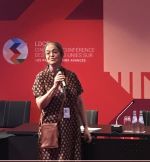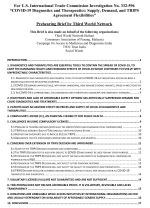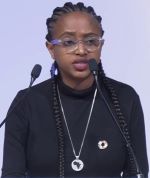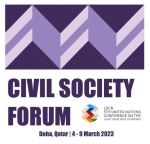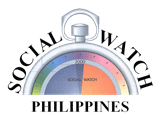Social Watch News
Published on Thu, 2023-06-08 16:17
“The diagnosis is not good, but we try to keep the roadmap to development” summarized Ambassador Lachezara Stoeva, president of ECOSOC, in her dialogue with civil society at the Civil Society Forum of the Fifth LDC Summit. The Economic and Social Council (ECOSOC) is the UN intergovernmental body in charge of overseeing the 2030 Agenda for Sustainable Development. |
Published on Wed, 2023-06-07 11:41
Statement by Roberto Bissio, on behalf of Social Watch, at the SDG Summit 2023 Informal Stakeholder Dialogue that was held virtually on 7 June 2023. |
|
Published on Tue, 2023-06-06 00:00
By Roberto Bissio* During the Summit on the Least Developed Countries (Doha, 5-9 March 2023), the UN convened a meeting of UN Resident Coordinators (RCs) of all 46 LDCs. UN reform measures to provide better in-country agency coordination and convening started with getting the RCs to report directly to the Secretary-General, DSG Amina Mohammed told the accompanying Civil Society Forum. |
|
Published on Mon, 2023-06-05 12:18
By Roberto Bissio* A reform in the international financial architecture is needed and urgent. High level UN officials and civil society agreed on that proposition during the UN Summit on the Least Developed Countries. “The international financial architecture is absolutely no longer fit for purpose. It is morally bankrupt” said UN deputy secretary general Amina Mohammed in a candid dialogue with civil society organizations at the closure of the Civil Society Forum on the last day of the Summit on the Least Developed Countries held in Doha last March 2023. |
Published on Mon, 2023-06-05 11:50
In her introductory comments to the first plenary of the Civil Society Forum at the LDC5 Summit, Gita Sen, General Co-coordinator for Development Alternatives with Women for a New Era (DAWN) summarized civil society interventions at the opening session, noting that these “set the tone for the seriousness of the challenges LDCs face and the Global South more generally”. |
Published on Wed, 2023-03-22 16:23
This brief discusses the important role of diagnostics and therapeutics in dealing with COVID-19 which in the near future will remain unpredictable and a threat to public health. It highlights global health experts persistently pointing to the inability of developing countries to effectively respond to COVID-19 due to lack of timely access to affordable diagnostics and therapeutics as the patent holding pharmaceutical industry prioritize higher-priced sales to developed countries. It stresses that high prices and lack of readily available affordable generic supply has artificially suppressed demand for COVID diagnostics and therapeutics. The brief elaborates on the effect of patents on access and the critical role of compulsory license and the TRIPS Decision in facilitating affordable access, and the challenges and opportunities in use of that very essential flexibility. |
Published on Thu, 2023-03-09 00:00
Chantal Umuhoza delivered the statement of the Civil Society Forum at the Closing session "Adoption of the Doha Political Declaration & Closure" of the LDC5 Conference held on 9 March 2023. Download pdf version of the Statement (French version is available here). Watch the Adoption of the Doha Political Declaration & Closure. The Civil Society Forum (CSF) was organized by a Core Group of civil society organizations composed of LDC-Watch, Third World Network, Social Watch and Global Policy Forum, in collaboration with the United Nations Office of the High Representative for the Least Developed Countries (UN-OHRLLS). The Civil Society Forum was held in Doha, Qatar, from 4 to 9 March 2023. |
Published on Sat, 2023-03-04 00:00
The LDC5 Conference was held in two parts. Part 1 adopted the new Doha Programme of Action for the Least Developed Countries for the Decade 2022-2031 (DPoA) on 17 March 2022 at the UN headquarters in New York. Part 2, the main Conference was held in Doha, Qatar, from 5 to 9 March 2023. The Civil Society Forum was organized by a Core Group of civil society organizations composed of LDC-Watch, Third World Network, Social Watch and Global Policy Forum, in collaboration with the United Nations Office of the High Representative for the Least Developed Countries (UN-OHRLLS). The Civil Society Forum was held in Doha, Qatar, from 4 to 9 March 2023. |
Published on Thu, 2022-12-15 14:48
Social Watch Philippines (SWP) - Alternative Budget Initiative Health Cluster (SWP - ABI) held a three-day capacity-building workshop on budget and policy advocacy and campaigns for water, sanitation, and hygiene at Hive Hotel and Convention Center, Quezon City on November 23-25, 2022. The activity was also accessible online via Zoom. The workshop training was participated by civil society organizations working on health, environment, and human rights, and those representing persons/children with disability, older persons, and urban poor communities. |
Published on Tue, 2022-11-15 19:29
The UN established the category of least developed countries (LDCs) in 1971, as many developing countries were navigating a path to development in the post-colonial period. The classification identified specific development challenges faced by these countries. |
SUSCRIBE TO OUR NEWSLETTER



